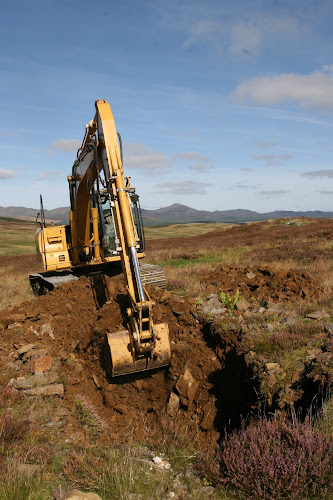Paul Lusty leads the Critical Raw Materials research area, within the Decarbonisation and Resource Management Challenge at the British Geological Survey. He is a Chartered Geologist with more than 19 years’ experience in the international natural resources sector, where his work has focused on minerals exploration, resource assessment and ore deposit science, with a particular focus on orogenic gold, platinum-group metals, volcanic-associated sulfide mineralisation and critical metals in granitic terranes. His most recent interests are in the formation of modern seafloor hydrothermal systems and deep ocean ferromanganese crusts.
 |
| The manufacture of renewable energy technologies, such as wind turbines will require a wide range of minerals in large quantities. © UKRI |
Action on climate change and the transition to a low- or zero-carbon economy are strategic priorities for many countries around the world including the UK. Among many other measures, this will require large-scale deployment of decarbonisation technologies for transport and industry, as well as for energy conversion and storage. This transformative roll-out will consume relatively large quantities of key minerals and metals, often known collectively as ‘critical raw materials’.
Manufacturing contributes about 10 per cent to the UK economy. This sector is dependent on the global mining industry and associated supply chains for the majority of its raw material needs. This dependence, and ‘just-in-time’ supply chains, mean that UK manufacturing is potentially vulnerable to supply disruption from events such as mine closures, strikes in producing countries and export quotas. Alongside recovery and recycling, domestic mining of minerals and metals is one option for improving security of supply. This is a strategy that many other countries, along with trading blocs such as the European Union, are pursuing. Domestic production could also enhance the transparency of supply chains, facilitating more responsible sourcing of raw materials.
 |
| In addition to iron and chromium, the production of stainless steel uses a range of alloying elements, including nickel. ©UKRI |
BGS undertakes research to monitor global production
of raw materials, assess risks to the disruption of supplies from overseas and
improve understanding of the Earth processes that produce mineral deposits. We
have recently reviewed the geological potential for the occurrence of selected
metals and minerals in the UK, based on publicly-available data and
information: this is presented in a new series of BGS profiles on cobalt, graphite, lithium, platinum-group metals and nickel, and the rare earth elements.
The UK has a long history of mineral exploration and
mining, which is summarised in the UK Exploration Guide. In
relation to its size, the UK is remarkably well-endowed with mineral resources;
the type and distribution of which are related to the wide range of geological
environments represented. Mining has been an industry here for at least 3000
years and ongoing mineral exploration demonstrates that significant resource
potential remains. During the industrial revolution iron, copper, tin and lead
were all produced in large quantities in the UK. Since the end of World War II
many other metals, such as gold, platinum, uranium and tungsten, have been the
focus of government-funded and commercial exploration programmes.
 |
| Mineral exploration drilling for copper-molybdenum-gold mineralisation in Scotland. ©UKRI |
The new BGS profiles show that there are many known occurrences in
the UK of the minerals and metals used in decarbonisation technologies.
However, the profiles also demonstrate that modern, systematic exploration for critical
raw materials has been very limited and few modern
resource estimates are available. By analogy with areas of similar geology elsewhere in the world there is
potential for future discoveries of these commodities in the UK. Accordingly,
the application of new exploration techniques based
on modern conceptual models is warranted for many deposits types in the UK.
 |
| Creating a trench to expose the bedrock during mineral exploration in Scotland. ©UKRI |
The prospects for UK production of most critical raw
materials are currently constrained by the limited potential of identified occurrences
or a lack of data to assess their potential, and restricted domestic capacity
for the processing and refining of these materials. These and other issues
related to UK metal supply are discussed in the BGS Metals Mineral Planning
Factsheet.

Comments